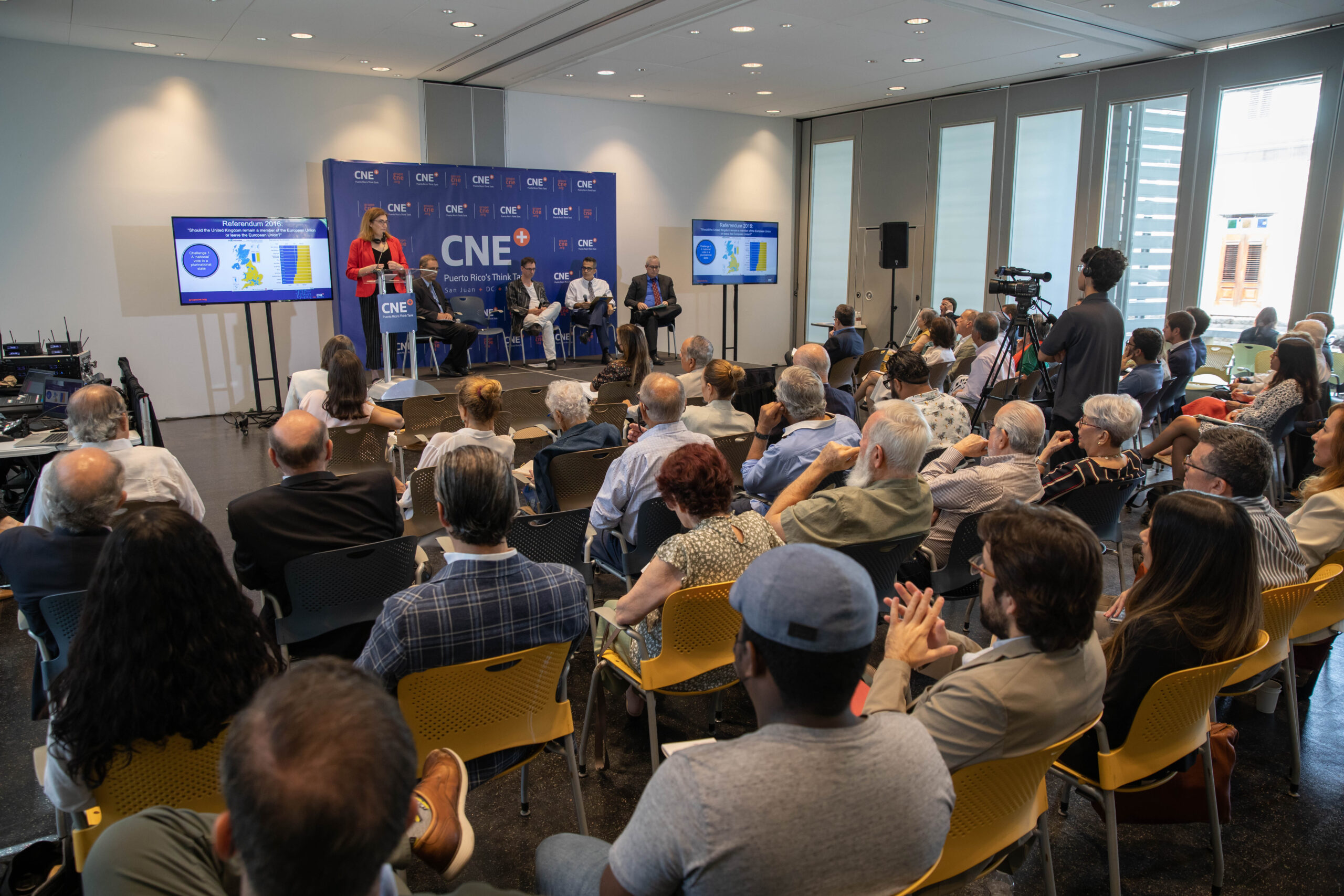
Published on November 17, 2022 / Leer en español
In This Issue
We present a summary of the current state of U.S. politics after the midterm elections and what the outlook is for Puerto Rico.
We also include some highlights of our most recent event, Puerto Rico’s Colonial Conundrum.
Insights + Analysis from CNE

The Midterm Election and Its Implications for Puerto Rico
By Sergio M. Marxuach, Policy Director
The Big Picture
Election results in the U.S. midterm elections are still coming in as we write this CNE Review but the big picture is fairly clear.
The Democrats apparently will lose control of the House. On the other side of the Capitol, contrary to expectations, the Democrats have managed to scratch out victories in Arizona and Nevada. In Georgia, there will be a second-round election on December 6. So, right now the Democrats control 50 Senate seats and the Republicans 49. That margin is enough to control the Senate, given that Vice President Harris would vote to break any ties in favor of the Democrats. It would be a mistake, though, to think that the race in Georgia doesn’t matter. In fact, given how close the midterms have been and the arcane rules of the Senate, it would make a significant difference.
Priorities for Puerto Rico
In the immediate term, that is before the end of 2022, the federal legislative priorities for Puerto Rico are:
- Medicaid: The federal share of the funding for Puerto Rico’s Medicaid program is scheduled to decrease from 76% to 55% on December 16. It is imperative for Puerto Rico’s fiscal stability and the adequate operation of the island’s Medicaid program that this scenario does not come to pass.
- Hurricane Fiona Disaster Relief Funding: The Pierluisi Administration has preliminarily estimated damages caused by Hurricane Fiona at approximately $10 billion. That money would need to be appropriated by Congress, hopefully through the expected emergency appropriations supplemental bill to be taken up during the lame duck session.
Broader Implications for Puerto Rico
Given the new correlation of forces in Washington, Puerto Rico’s strategy in D.C. will have to shift from one seeking parity in federal funding for programs such as Medicare and Supplemental Security Income, to one of defending what we have already gained. For example, Rep. Cathy McMorris Rodgers (WA) is expected to become Chairwoman of the House Energy and Commerce Committee, which has primary jurisdiction in that chamber over Medicaid. She has already stated her opposition to a Centers for Medicare & Medicaid Services (“CMS”) interpretation of 2019 legislation which provided significantly increased federal annual capped funding for Medicaid to the territories for FY2020 and FY2021. The CMS interpretation extended the duration of the higher Medicaid capped funding beyond FY2021. As Chairwoman of the Energy and Commerce Committee, she may challenge the CMS interpretation and probably seek to lower the amount of capped Medicaid funding available to Puerto Rico.
Congress is also expected at some point during the spring of next year to take up a massive five-year Farm Bill, which will cover everything from farmer subsidies to nutritional assistance. The main Farm Bill policy objective of the government of Puerto Rico and many NGOs on the island is to seek a transition from the current Nutritional Assistance Program to the nationwide Supplemental Nutritional Assistance Program, known as SNAP. The transition to SNAP would entail higher nutritional assistance funding, as well as other benefits, for Puerto Rico. Given the expected new majority in the House, that will certainly be a challenge. With the help of our supporters CNE, and other NGOs, will continue to advocate for this issue.
It would be a mistake, though, to think that there is no space for Puerto Rico to obtain some wins in the federal policy arena. Those policy wins can be achieved if advocacy organizations and the island’s government adapt to the new reality in Washington. That adaptation implies learning to play interstitial politics, navigating between and staying away from the most extreme factions in both parties, while moving towards those members from both parties that are closer to the center. Granted, that is a tight political space given the expected composition of both chambers, but that is where any deals between the Biden Administration and Congress are most likely to be made.
Policy success under the new balance of power in D.C. will also entail learning and using a new language to communicate our message on the Hill. The fact that 55% of Puerto Rican voters in Florida voted for Gov. DeSantis signals that the Puerto Rican community in the states has become ideologically diverse and is not reflexively liberal or progressive. That political change could be very useful when approaching Senators Rubio and Scott or members of the Florida delegation in the House.
These new conditions probably make many people in Puerto Rico quite uncomfortable, perhaps rightly so. But we really don’t have an option given the nature of the political relationship between Puerto Rico and the United States; our nominal representation in Congress; the new political dynamics in Washington; and Puerto Rico’s great economic and social needs. Adapting to the new political conditions in the U.S. is the only strategy likely to be successful in avoiding two years of stagnation and achieving some policy victories in Washington.
CNE Holds Conference on Puerto Rico’s Status Conundrum
On October 21st, CNE held a conference on Puerto Rico’s perennial status problem. However, instead of focusing on the traditional analysis and discourse about this issue, CNE, together with UPR professor Jaime Lluch, decided to apply the lens of comparative political science to Puerto Rico’s colonial dilemma.
Using a comparative perspective would allow the comparison of Puerto Rico’s autonomy with other autonomic entities from around the world; permit the comparison of the U.S. federalist system with other federalist systems; facilitate the analysis of national movements in Puerto Rico with other national movements around the world; provide for the examination of constitutional accommodation in Puerto Rico in a comparative perspective; allow for the use of quantitative methods to compare the degree of Puerto Rico’s self-government with that of other sub-state national entities; and permit the evaluation of options for Puerto Rico’s future in light of normative political theory.
The attendees of the conference heard from several distinguished scholars and political scientists from around the world. The two main panels consisted of Nicola McEwen, Ph.D., from the University of Edinburgh; André Lecours, Ph.D., from the University of Ottawa; Jordi Argelaguet, Ph.D., from the Universidad Autonoma de Barcelona; Rogers M. Smith, Ph.D., from the University of Pennsylvania; André Fazi, Ph.D., from Università di Corsica Pasquale-Paoli; and Héctor López-Bofill, Ph.D., from the Universitat Pompeu Fabra in Barcelona. In addition to these distinguished visitors, Jaime Lluch, Ph.D., from the University of Puerto Rico; and Jennifer Wolff, Ph.D., Deepak Lamba Nieves. Ph.D., and Sergio M. Marxuach from CNE, also participated in the event.
The presentations covered the political status of jurisdictions such as Quebec, Scotland, Barcelona, and Corsica and highlighted many important concerns that Puerto Ricans have discussed for decades. The event, coordinated by CNE’s Madrid Policy Bureau and professor Lluch, was the beginning of a long overdue conversation and represents a novel approach to Puerto Rico’s long-standing political status issue.
To watch the presentations click here.

